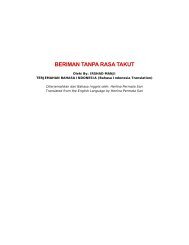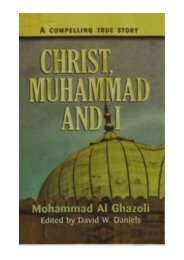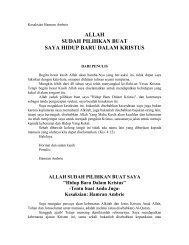A Critical Analysis of 'Real Islam'. Its People ... - Bukti dan Saksi
A Critical Analysis of 'Real Islam'. Its People ... - Bukti dan Saksi
A Critical Analysis of 'Real Islam'. Its People ... - Bukti dan Saksi
Create successful ePaper yourself
Turn your PDF publications into a flip-book with our unique Google optimized e-Paper software.
Anas b. Malik reported that Allah's Messenger (may peace be upon him) let the dead bodies <strong>of</strong> the unbelievers<br />
who fought in Badr (lie unburied) for three days. He then came to them and sat by their side and called them<br />
and said: O Abu Jahl b. Hisham, O Umayya b. Khalaf, O Utba b. Rab'ila, O Shaiba b. Rabi'a, have you not<br />
found what your Lord had promised with you to be correct? As for me, I have found the promises <strong>of</strong> my Lord to<br />
be (perfectly) correct. Umar listened to the words <strong>of</strong> Allah's Apostle (may peace be upon him) and said: Allah's<br />
Messenger, how do they listen and respond to you? They are dead and their bodies have decayed. Thereupon he<br />
(the Holy Prophet) said: By Him in Whose Hand is my life, what I am saying to them, even you cannot hear<br />
more distinctly than they, but they lack the power to reply. Then he commanded that they should be buried in<br />
the well <strong>of</strong> Badr.<br />
The "promise" that Muhammad was talking about was a curse that the vindictive prophet had laid on<br />
these men when he was in Mecca and they had derided him when someone dumped the manure <strong>of</strong> camel<br />
on his back. On that occasion Muhammad said: "O Allah! Punish Abu Jahl, 'Utba bin Rabi'a, Shaiba bin<br />
Rabi'a, Al-Walid bin 'Utba, Umaiya bin Khalaf, and 'Uqba bin Al Mu'it. (Bukhari Volume 1, Book 4,<br />
Number 241)<br />
The following story can cast more light on the revengeful and implacable character <strong>of</strong> Muhammad.<br />
Among the captives was Abul Bokhtari. He had shown kindness to Muhammad and was especially<br />
instrumental in procuring his and his followers release from the quarters <strong>of</strong> Abu Talib, in a time that the<br />
Quraish had boycotted him and his family and they were living in a state <strong>of</strong> self-imposed house-arrest,<br />
Muhammad, mindful <strong>of</strong> this favor, proclaimed that he should not be harmed. However, Abul Bokhtari<br />
had a companion whom Muhammad did not want to let go. He pleaded for his friend’s life but<br />
Muhammad would not budge. So he exclaimed: "The women <strong>of</strong> Mecca; shall never say that I abandoned<br />
my comrade through love <strong>of</strong> life. Do thy work upon us both." Thus, feeling released from all moral<br />
obligations, Muhammad killed both <strong>of</strong> them. Here we see a man not only murdering prisoners <strong>of</strong> war, but<br />
also killing someone to whom he owed a personal favor simply because he could not let go <strong>of</strong> the<br />
pleasure <strong>of</strong> taking revenge on a personal enemy.<br />
On their way back to Medina from the raid at Badr, one <strong>of</strong> the prisoners put to death was a devoted<br />
father named Uqbah bin abi Muait. Before his execution the man pleaded with Mohammed saying, "Who,<br />
then, will take care <strong>of</strong> my little girl?" Mohammed’s ‘merciful’ answer: "Hell-fire."<br />
So who exactly was this Muhammad, the man hundreds <strong>of</strong> millions are striving to emulate? As has<br />
been shown, the face he showed his enemies was not nearly so beautiful and pleasing as the face shone to<br />
believers. Muhammad was a man <strong>of</strong> war who sent out or went out on at least 74 expeditions and raids in<br />
only a ten year period (622-632), and who personally conducted 24 major military campaigns. His carnal<br />
lusts for young flesh (wives, sex-slaves, and even children) are legendary, but it was through violence and<br />
murder where he gained power and wealth. He was wounded in battle (Battle <strong>of</strong> the Trench) and<br />
undoubtedly personally slew victims. By promising virgins and bounty in this life and the next, he<br />
inspired men to his self-serving cause. Through Jihadic war he unified the Arab tribes, further<br />
consolidating his power through personally ordered assassinations <strong>of</strong> individual opponents as well as<br />
murder, exile, or enslavement <strong>of</strong> all defeated peoples.<br />
Tabari (AD 839-923) was an early Muslim historian considered largely reliable by scholars today.<br />
Tabari lists Muhammad’s assets at his death (horses, camels, milch sheep, and so on), including his<br />
weapons. In fact Tabari records the nicknames Muhammad’s had lovingly given those instruments which<br />
were such a large part <strong>of</strong> his life. Muhammad nicknamed three swords that he took from the Qaynuqa<br />
Jewish tribe after banishing them from Medina: “Pluck Out,” “Very Sharp,” and “Death”. Two other<br />
swords from elsewhere are named: “Sharp” and “That is wont to sink” (presumably into human flesh).<br />
After his Hijrah (Emigration) from Mecca to Medina in 622, he owned a sword called “Having the<br />
vertebrae <strong>of</strong> the back.” which he collected as booty from his victory at the Battle <strong>of</strong> Badr. Muhammad<br />
also named bows: “Most conducive to ease, or wide,” “white,” and “<strong>of</strong> nab wood”. The name <strong>of</strong> a coat <strong>of</strong><br />
mail implies “ampleness” or “redun<strong>dan</strong>t portions,” probably because Muhammad was portly (cf. Ibn<br />
Ishaq, Life <strong>of</strong> Muhammad, trans. Guillaume, p. 383). Finally, Muhammad himself had a few nicknames.<br />
After Tabari lists several positive ones, he matter-<strong>of</strong>-factly provides one that is particularily telling: “The<br />
obliterator”. (Tabari; Volume 9, pp. 153-55, trans. Ismail K. Poonawala.; University <strong>of</strong> New York Press)





